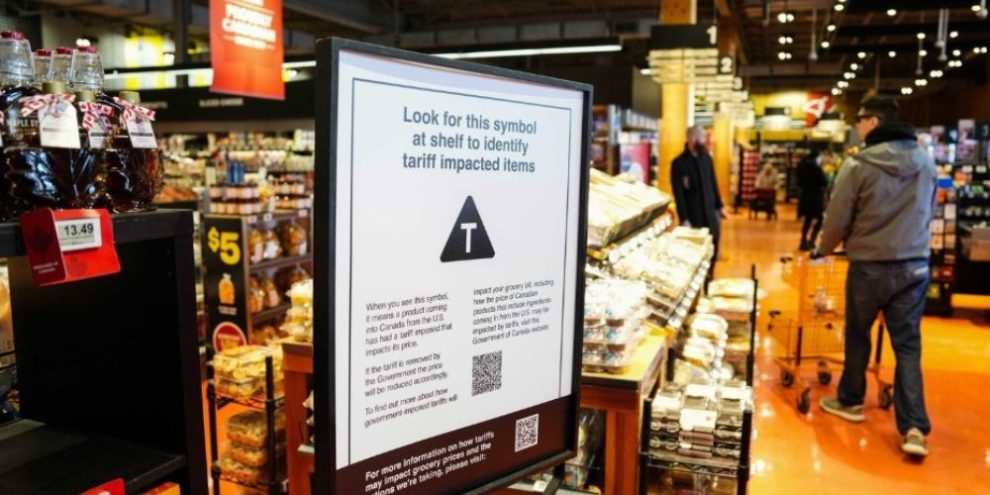
Updated May 14, 2025 @ 4:53pm
The number of tariff-hit products at the grocery store could soon spike as pre-tariff inventory runs out, said Loblaw Cos. Ltd. chief executive Per Bank, which means prices for some items will go up too.
Loblaw has been aggressive in marking which products are affected by tariffs, a tally that so far it has limited to a little over 1,000 items. But that total will rise to more than 3,000 within the next week or two, and could peak at over 6,000 within the next two months, said Bank in a LinkedIn post on Wednesday.
"While the tariff situation might be improving between the U.S. and other countries, that’s not yet the case here in Canada. In fact, we’ll be facing a large wave of tariff-related increases in the weeks ahead," he said.
Tariff-affected items will still account for a small share of the roughly 80,000 items the company stocks, but customers will notice changes in categories including natural foods, pantry staples and health and beauty products, he said.
"It’s been good to see Prime Minister Carney and other leaders engaging in dialogue with U.S. officials, as we’re all hoping for a rapid de-escalation of this situation."
Barrie's News Delivered To Your Inbox
By submitting this form, you are consenting to receive marketing emails from: Central Ontario Broadcasting, 431 Huronia Rd, Barrie, Ontario, CA, https://www.cobroadcasting.com. You can revoke your consent to receive emails at any time by using the SafeUnsubscribe® link, found at the bottom of every email. Emails are serviced by Constant Contact
Bank also said he was pleased to see the federal government has changed its counter-tariff policies to limit the charges to finished food products coming in from the U.S.
In mid-April, the government announced several adjustments to the $60 billion in counter-tariffs it announced in March to ease the burden on Canadian companies and consumers.
A key measure for grocers was a six-month suspension of counter-tariffs on a broad range of U.S. goods used in Canadian manufacturing, processing and food and beverage packaging. That means, for example, a Canadian company could import something like milk if it's used to make another product without the additional counter-tariffs, but milk for retail sale wouldn't be exempt.
From the start, the counter-tariffs excluded U.S. produce like lettuce, which the Canadian market is especially reliant on.
Canada's counter-tariffs have generally targeted items that have alternatives produced in Canada, so areas like dairy, poultry and grains, said Mike von Massow, a University of Guelph professor and food economist.
"They put them on things that were highly substitutable, so that if you were willing to make small changes, you weren't going to get impacted as much," he said.
"Now, if you are interested in a specifically aged cheddar from Wisconsin, then that's going to go up in price."
While many items aren't directly tariffed by Canada, there are indirect price pressures from other areas like U.S. metal tariffs, and the general uncertainty brought on by the trade war, he said.
"The uncertainties with the U.S., it has the potential to increase prices even in the absence of tariffs."
Loblaw's head-on approach to tackling tariff increases could help reduce consumer frustration in the grocery aisles where Canadians can most visibly see the impact of tariffs, said Jenna Jacobson, associate professor and Eaton Chair in Retailing at Toronto Metropolitan University.
"It's diverting the negative blame from the retailer to these external policy or political issues," said Jacobson.
She said Loblaw is notable for coming out so specifically on tariff impacts, but that all grocers have been highlighting Canadian-made products.
But while the transparency could work well for the company, there are trust concerns given how quickly the tariff situation is changing.
"It's basically an effort to simplify something that is very complex," said Jacobson. "That simplification has to be done accurately, otherwise, it serves to distort consumer perceptions."
While Canada has added numerous exemptions to its counter-tariff measures, they remain on high-profile grocery items like orange juice and alcohol as well as a host of other products ranging from uncooked pasta to guinea fowl in a glass jar.
This report by The Canadian Press was first published May 14, 2025.
Companies in this story: (TSX:L)





